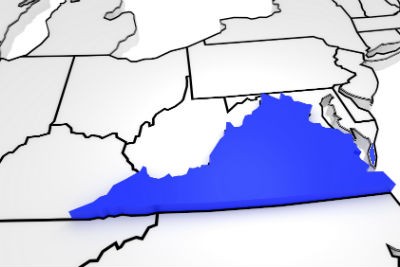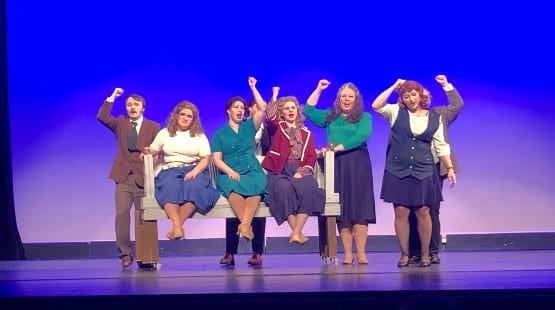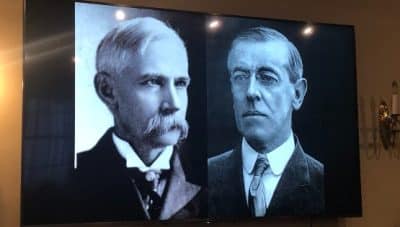
If you live near Virginia Tech’s Blacksburg campus, chances are good you live in Appalachia, the storied cultural region that meanders through 13 states, from Mississippi to New York. That doesn’t mean you know much about it. For many, Appalachia is a fuzzy concept, a combo-pack of stereotypes and statistics.
That changes fast for students in Virginia Tech’s transdisciplinary Appalachian Community Research (ACR) course, an elective in the new Appalachian Cultures and Environments Pathways minor. For Emily Satterwhite, an associate professor in the Department of Religion and Culture, who’s co-taught the class for three of the past four years, the proof is in the end-of-semester student reflection papers. “There’s a strong theme of, ‘How have I been here three or four years and not ever spoken to a local person about what it’s like to live here?’” she said.
Or, as one past student put it, “Academia rarely seems to be more than peripherally connected with its greater community. This class was very special in the way that it was entirely shaped by it.”
The course is shaped by it, and hoping to have an impact on it, most recently by tackling one of Appalachia’s most intractable problems: its substance use crisis.
A plane full of people
Between April 2020 and April 2021, 100,000 Americans died from drug overdoses. That’s like an airplane full of people falling out of the sky every single day for a year.
Things are particularly dire in Appalachia, where the overdose mortality rate in 2018 was 43 percent higher for 25- to 54-year-olds than it was elsewhere in the country.
Yet, until he signed up for the Appalachian Community Research class in fall 2021, none of this was really on Saket Bikmal’s radar. “I’d heard of the opioid crisis in Appalachia,” said the senior in computational and systems neuroscience, who hails from Northern Virginia. Beyond that, “I was actually pretty clueless to this whole thing.”
On the first day of class in Solitude, the 200-year-old historic home near the Duck Pond, Satterwhite and co-teacher Julia Gohlke, an associate professor of environmental health in the Virginia-Maryland College of Veterinary Medicine, challenged their students to develop policy recommendations for substance use disorder recovery in Southwest Virginia. ACR participates in a grant program from the Appalachian Regional Commission, called the Appalachian Teaching Project, which stipulates that students conduct original research and develop an innovative project to bolster community development in Appalachia.
The course’s 11 students conducted interviews with 27 key informants, including government officials, local nonprofit leaders, and medical professionals. Cheryl Hartman, a faculty member in the Department of Psychiatry and Behavioral Medicine at Virginia Tech Carilion School of Medicine, spoke with students several times, as did Sam Rasoul, a member of the Virginia House of Delegates from Roanoke.
One of the best conversations happened early in the semester with community partner Bently Wood, a peer recovery specialist with New River Valley Community Services, who shared his personal experiences with drug addiction and recovery. Hearing Wood’s story changed Bikmal’s ideas about substance use. Suddenly he could see how someone’s life could land here. How Wood wasn’t so different from him. “I think that’s probably what started the emotional connection for me,” he said.
ACR students from a cross-section of majors such as public health, biological sciences, and humanities for public service embraced Wood’s guidance on person-first language, abandoning the term “addict” in favor of the less-stigmatizing “person with substance use disorder.”
They also participated in Hokie Wellness’s REVIVE! training for reversing an opioid overdose with NARCAN nasal spray. “I think that it felt important to the students to be able to go into the world with such specific knowledge of how to help people who are struggling, not just to study them,” Satterwhite said.
But the major project — the one that students would present to the Appalachian Regional Commission at the end of the semester — took a while to take shape.
In past semesters, ACR students had researched hospital protocols for people with a substance use emergency; the utility of needle exchanges; the effects of COVID-19 and the accessibility of telehealth services on people with substance use disorder; even, back in fall 2018, community health concerns related to the Radford Army Ammunition Plant. Linsey Marr, the Charles P. Lunsford professor of civil and environmental engineering who helped design the course, collected air samples to test for pollution, Chris Thompson of the School of Neuroscience tested blood samples from local cows, and students interviewed residents who lived near the plant.
Findings from the 2018 class’s research were published in the International Journal of Environmental Research and Public Health — a coup for the undergraduate students involved. The most important impact, said Gohlke, may have been “getting students out of the university environment so they understand that [the university] is a bubble. Right outside of the border of the university, there are people who have just completely different lives.”
To find their next project, ACR students would have to leave the bubble.
No tests today
One issue that came up repeatedly in interviews with key informants was the pervasive lack of housing and treatment facilities in Southwest Virginia for those who suffer from substance use disorder.
Currently, services are available for only about one in 10 people who need them, said Wood. Pregnant women, new mothers, and those with additional health problems are at particular risk.
Perhaps, it was suggested, Catawba Hospital, a sprawling state mental health facility northeast of Blacksburg, could be expanded into a substance use disorder treatment facility.
Hannah O’Malley, a senior majoring in neuroscience, didn’t think college students took field trips. But early in November, she found herself riding in a Virginia Tech van through the autumn leaves outside Blacksburg, headed toward Catawba Hospital’s 700 forested acres. “I had never heard of this happening in a class before,” O’Malley said. “Usually you go in, and you take a test.”
No tests today. Satterwhite drove the van onto the Catawba Hospital grounds. Five students hopped out. With supervision from the hospital’s chief operating officer, Cynthia McDaniel, they explored the grounds, originally built in 1858 as a resort.
Amanda Ljuba, a junior majoring in criminology and sociology, was skeptical when she eyed the antiquated main hospital building. “It looked like Chernobyl,” she said.
Could this motley assortment of gardens and basketball courts, brick and stone outbuildings, be repurposed into a holistic facility offering addiction treatment, medical care, counseling, and stable housing? The more they explored, the easier it became to catch the vision. The site was close enough to Roanoke to attract workers and access additional services. The natural setting provided its own healing balm.
Two hours later, when the students and Satterwhite climbed back into the van, they were convinced. Here was their project.
Where others fear to tread
Of course, one semester would not be remotely long enough to make over Catawba Hospital, a project that could cost $200 million. ACR students settled on championing a feasibility study for the project that they hoped to introduce in the Virginia General Assembly.
With the help of a “You Write the Bill” workshop that Rasoul led for the class, they came up with legislation that recommends looking at “transforming Catawba Hospital into a facility at which a continuum of substance abuse treatment and recovery services, including long-term, short-term, acute, and outpatient services, is provided.” As O’Malley said, “I had no idea that I could actually be so much more involved in the whole legislative process than I ever could have imagined.”
In November, class members gathered at Solitude to present their project to the Appalachian Regional Commission. Normally this would happen in person in Washington, D.C., — a plan scuttled by COVID-19. This year, they listened by Zoom as other Appalachian Teaching Project students from across the region spoke about community gardens and electric car charging stations. Then they delivered their own well-rehearsed group presentation about substance use disorder.
According to Kostas Skordas, director of research and evaluation for the Appalachian Regional Commission, Virginia Tech’s ACR students are “tackling topics where others might fear to tread. They’re thorny issues. But having students present their take on this is really refreshing, because it is serious work, and it offers us all a chance to rethink what we thought the solutions were to these problems.”
While the stigma surrounding issues of substance use can make leaders pretend the problem doesn’t exist, “Virginia Tech students say, no, it is absolutely a challenge, but we will meet that challenge head on,” Skordas said.
Kickstarting hope
Even after the end of the fall semester, more than half ACR’s students, including Bikmal, O’Malley, and Ljuba, made the surprising decision to keep advocating for the Catawba Hospital feasibility study. So far, so good. Sam Rasoul filed the bill, HB 105, early in January 2022, and picked up a co-sponsor in Delegate Joe McNamara, who represents the area where Catawba Hospital is located.
More obstacles remain in the 60-day legislative session that convened on Jan. 12. The bill still needs to be assigned to a committee. It needs approval for a budget amendment, not to mention a passing vote.
That’s okay. “This process will obviously take years,” said Bikmal. “But we want to be kind of the kick starter that sparks this project. The motivation of helping people and seeing the opioid crisis subside is what drives us.”
By getting students emotionally and educationally into the broader community semester after semester, ACR produces the kind of passion and persistence for Appalachia that is a source of hope to people who live there. “We’re creating change agents,” said community partner Bently Wood. “That’s absolutely what I believe.”










